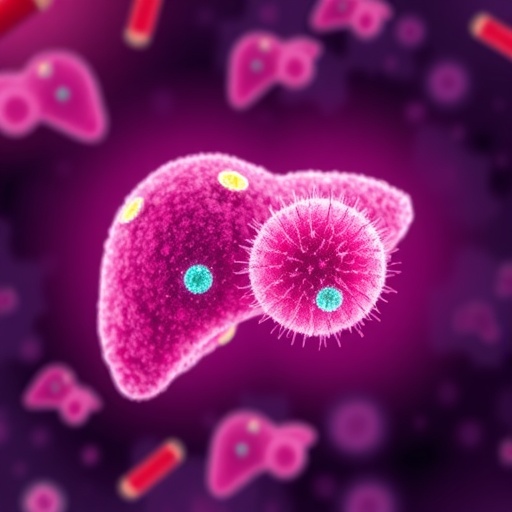
In a groundbreaking advancement that could reshape the landscape of infectious disease diagnostics and cancer detection, researchers have unveiled an innovative immunomics-guided approach targeting human liver fluke infections and the devastating cholangiocarcinoma cancers they often provoke. This pioneering study leverages cutting-edge immunological and computational techniques to identify novel biomarkers, providing a powerful new window into both early detection and mechanistic understanding of these complex diseases. As liver fluke infections continue to impact millions globally, predominantly in Southeast Asia, the potential clinical and epidemiological ramifications of this research are immense.
The liver fluke, particularly Opisthorchis viverrini, represents a significant health burden due to its role as a confirmed carcinogen inducing cholangiocarcinoma, a highly aggressive bile duct cancer notorious for poor prognosis and limited treatment options. The challenge has long been the lack of sensitive, specific, and easily accessible diagnostic tools that can detect both the parasite and the associated malignancy during the critical early stages. This study introduces immunomics—a fusion of immunology and omics technologies—as an elegant solution that deciphers the complex host-pathogen interplay to pinpoint reliable molecular signatures indicative of infection and neoplastic transformation.
At the heart of this approach lies the comprehensive profiling of the human antibody repertoire in response to liver fluke antigens. By applying high-throughput techniques to capture the breadth and specificity of host immune responses, the researchers identified unique antigenic targets that mirror infection status and tumor presence. This strategy departs from classical diagnostics reliant on microscopy or imaging, which often fail to detect occult or nascent disease, instead capitalizing on the immune system’s natural ability to generate targeted antibodies as a rich source of diagnostic clues.
.adsslot_6Yyi12CfHq{width:728px !important;height:90px !important;}
@media(max-width:1199px){ .adsslot_6Yyi12CfHq{width:468px !important;height:60px !important;}
}
@media(max-width:767px){ .adsslot_6Yyi12CfHq{width:320px !important;height:50px !important;}
}
ADVERTISEMENT
The team employed advanced protein microarrays, densely populated with liver fluke-derived antigens, to systematically expose patient sera and detect reactive antibodies with unrivaled depth and specificity. This not only enabled an expansive mapping of host immune recognition patterns but also facilitated the discrimination between simple infection and progression towards carcinogenesis. Such differential immunoprofiles are critical for stratifying patients who are at elevated risk for developing cholangiocarcinoma, allowing for earlier intervention and improved surveillance protocols.
Adding a layer of computational sophistication, machine learning algorithms were harnessed to analyze the vast immunological datasets, identifying patterns and combinations of biomarkers with the highest predictive value. This integrative bioinformatics pipeline transformed raw antibody binding data into actionable clinical insights, highlighting how multidisciplinary approaches can unlock complex biological signals previously obscured by data size and heterogeneity. The deployment of these predictive models showed promising accuracy in multiple patient cohorts, underscoring the reproducibility and robustness of the discovered biomarkers.
Importantly, the study does not merely identify biomarkers but also provides functional insights into the immune dynamics underpinning liver fluke infections and their oncogenic sequelae. By dissecting which antigenic components elicit stronger antibody responses, the research sheds light on parasite-host interactions that may drive chronic inflammation and tumorigenesis. This mechanistic understanding is poised to inform not only diagnostic tool development but also targeted therapeutic interventions aiming to disrupt these pathological processes at the molecular level.
Epidemiologically, this immunomics platform holds promise for revolutionizing screening programs in endemic regions where morbidity and mortality from liver fluke-associated cholangiocarcinoma remain unacceptably high. Traditional diagnostic limitations have contributed to late-stage cancer presentations, often after curative options have closed. The ability to implement minimally invasive serological assays based on well-validated biomarkers could transform public health strategies, enabling large-scale population screening and timely medical follow-up.
Beyond its immediate clinical applications, the study sets a precedent for the integration of immunomics in the study of other parasitic infections and infection-associated cancers. The successful example of liver fluke and cholangiocarcinoma illustrates the broader potential for immune signatures to serve as sensitive sentinels of pathogen exposure and disease progression in diverse contexts. It underscores the increasingly crucial role of systemic immunoprofiling and machine learning in deciphering complex disease etiology and enhancing precision diagnostics.
The collaborative effort behind this research, involving multidisciplinary teams spanning immunology, parasitology, oncology, and computational biology, exemplifies the integrative approach required to tackle multifaceted biomedical challenges. Combining high-resolution immunological assays with robust computational analytics demonstrates how modern research transcends traditional boundaries to foster discoveries with substantial translational impact.
Challenges remain, of course, in translating these findings into widely available diagnostic kits and ensuring their accessibility in low-resource settings where the disease burden is highest. The path from biomarker discovery to clinically approved tests involves rigorous validation, standardization, and regulatory approval processes. Yet, the foundational work presented here offers a critical proof-of-concept, highlighting biomarkers with the potential to overcome previous clinical inertia.
Looking towards future directions, the immunomics-guided biomarker panel could be further refined to enhance specificity and sensitivity, potentially incorporating longitudinal monitoring to track treatment responses or disease progression. Integration with emerging technologies such as point-of-care platforms and smartphone-based diagnostics could facilitate decentralized testing, crucial for rural and underserved populations. Moreover, the approach may stimulate vaccine development efforts by identifying key immunogenic proteins worthy of further exploration as vaccine antigens.
The impact on cholangiocarcinoma prognosis could be transformative, as earlier detection shifts clinical management towards curative interventions. This aligns with broader goals in oncology to move from symptom-driven diagnosis to proactive disease interception. Immunomics, as showcased by this study, offers a promising pathway to achieve that paradigm shift in infection-associated cancers specifically.
Furthermore, this research underscores the intersection of infectious diseases and oncology, elucidating how chronic infections can instigate oncogenic cascades through persistent inflammation and immune modulation. By deepening our understanding at the immunological interface, scientists and clinicians are better equipped to design integrated management strategies targeting both infection and tumor biology.
The publication of these findings in a high-impact journal amplifies their visibility, encouraging immediate exploration by the wider scientific community. Such dissemination is crucial for generating collaborative networks, securing funding for follow-up studies, and galvanizing stakeholders across healthcare sectors to adopt innovative diagnostics and surveillance methods.
In sum, the immunomics-driven biomarker discovery for liver fluke infection and cholangiocarcinoma represents a milestone that bridges fundamental science and clinical utility. It exemplifies how leveraging the immune system’s complexity, combined with the analytical power of machine learning, can overcome longstanding diagnostic challenges. As these technologies migrate from research to routine application, the prospect of reducing liver fluke-associated cancer mortality may become an achievable reality.
The reverberations of this work extend beyond liver fluke disease, heralding a new era in infectious disease-associated cancer diagnostics where tailored biomarker panels inform personalized medicine. This convergence of disciplines sets a powerful precedent for addressing global health burdens with precision, innovation, and scalability.
Continued investment in immunomics, alongside sustained international collaboration, will be essential to maximize the benefits of such biomarker advancements. Importantly, patient-centered approaches ensuring ethical, equitable access and culturally sensitive deployment strategies must accompany technological progress to fully realize public health impact.
As the scientific community anticipates subsequent clinical trials and validation efforts, the biomedical field stands on the cusp of a transformative leap against one of the deadliest infection-driven cancers. The promise of immunomics-guided precision diagnostics shines brightly, illuminating pathways towards earlier detection, improved survival, and ultimately, the alleviation of suffering caused by liver fluke infections worldwide.
Subject of Research: Immunomics-guided biomarker discovery for human liver fluke infection and associated cholangiocarcinoma.
Article Title: Immunomics-guided biomarker discovery for human liver fluke infection and infection-associated cholangiocarcinoma.
Article References:
Sadaow, L., Rodpai, R., Smout, M.J. et al. Immunomics-guided biomarker discovery for human liver fluke infection and infection-associated cholangiocarcinoma. Nat Commun 16, 5965 (2025). https://doi.org/10.1038/s41467-025-61043-2
Image Credits: AI Generated
Tags: bile duct cancer research advancementscancer biomarkers discoverycholangiocarcinoma early detectionhost-pathogen interactions in cancerimmunological techniques in oncologyimmunology and omics integrationimmunomics in cancer detectioninnovative diagnostic tools for infectionsliver fluke infection biomarkersmolecular signatures in liver fluke infectionsOpisthorchis viverrini health impactSoutheast Asia infectious diseases



